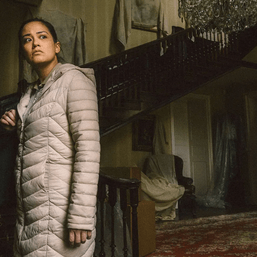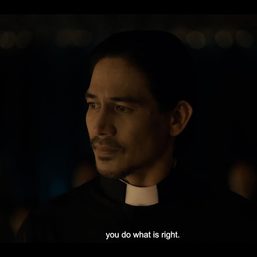SUMMARY
This is AI generated summarization, which may have errors. For context, always refer to the full article.
![[OPINION] Women and violent extremism](https://www.rappler.com/tachyon/r3-assets/0812A9AFB3A84E92B5C510A4E3BBBD93/img/2E0D94F60FAD414796DBAE11E1CA55E1/women-violent-extremism-20180526.jpg)

This opinion piece is part of the Silver Lining Series written by members of the Council of Asian Liberals and Democrats (CALD), an organization of liberal and democratic parties in Asia, to celebrate its 25th anniversary this year.
Why are women attracted to violent extremism?
In the country where I come from, Malaysia, a 26-year-old doctor traveled to Syria and entered into an arranged marriage with a Mujaheed or jihad fighter. She sent shockwaves across Malaysia because of her regular updates on social media about her experiences as a “Muhajirah” or immigrant to Syria.
And she is not alone. In early 2015, Malaysian police arrested a 27-year-old woman who had married one of the jihad fighters over Skype after watching an Islamic State (ISIS) propaganda video. Just last year, 20 Malaysian women looking for love with ISIS fighters were duped of millions of ringgit and left stranded on the Turkey-Syria border.
These incidents clearly show the power of persuasion of militant groups, specifically of ISIS, over Muslim women. Our women appear to be succumbing to the gender stereotypes propagated by militant groups.
Extremist organizations promote damaging gender stereotypes in recruiting young men and women – glamorizing men’s engagement in violent activity and encouraging young women to join their cause through marrying fighters and bearing children.
Recruiting women allows terrorist organizations to access an additional 50% of the population. And although women’s involvement in terrorist and extremist activities is not a recent development, their presence as frontline activists, propagandists, and recruiters is increasing around the globe.
It’s just as fascinating, as it is frightening, that young, modern London schoolgirls to educated women in Malaysia are trying to join the ranks of extremist organizations like ISIS.
Nuancing women’s experiences
In understanding why women are drawn to militant fighters, it is important to note at the outset that stereotypes about the subservience of Muslim women, especially from Muslim-majority countries such as Malaysia, form a major barrier to comprehending the militant groups’ appeal to women. And as we tend to be fixated in our views of how these terrorist organizations oppress women, we also struggle to acknowledge and really understand female involvement in violent extremism.
A useful starting point is to draw distinctions among women who support, women who join, and women who become involved in these groups. There is also a significant difference between those who believe that women are making active decisions to join, and the notion that women are being actively recruited to join such groups, in which case, they are perceived as much more passive subjects.
The media mostly portrays the latter – that women are “groomed” by jihadi recruiters. This is a misogynistic portrayal of women. Studies show that the majority of women who support, join, or are recruited to these groups are actually moderately to well-educated women. So the women are making choices here.
It is just that the choice that they are making is not what we as a society expect them to make because we believe that these groups are only offering opportunities that bind women, that enslave women, that exploit women. Yet for many women who are actually joining these groups, they see it as a form of empowerment, liberation, and an opportunity to live in a society with a belief system that they subscribe to.
Muslim women, for one, are expected to behave a certain way and dress a certain way, failing which, they are taunted and even verbally abused. While these could be nonchalantly dismissed, one has to take a closer look at these experiences to prevent women from feeling disempowered and from joining the ranks of militant groups as a way of seeking empowerment, however ironic this may sound.
At present, law enforcement and governments tend to focus on responding only to the terrorist acts, and fail to address intolerance as a root cause of radicalism. There is also no explicit government or inter-governmental framework or institutional mechanisms for recognizing and supporting the role of women in preventing violent extremism in Malaysia or in the region.
This has to change. After all, women and girls are impacted by rising extremism differently than men and boys. They are often the first victims of violent attacks; their rights and mobility, as well as economic capacities, are compromised even more than their male counterparts.
However, while there is growing awareness of how women and girls suffer from the impact of violent extremism, there is less understanding of the role that women may play in countering and preventing it.
Addressing violent extremism
So we arrive at the most crucial question – what can women do to counter violent extremism?
The ASEAN Regional Action Plan on Women, Peace, and Security, which incorporated a range of threats to women’s security including violent extremism, conflict, and natural disasters, could provide the regional framework to mobilize and coordinate women’s participation in the development of strategies to prevent violent extremism and promote best practices across communities.
There are indeed best practices that we can learn from. The Women’s School for Peace in Poso, Central Sulawesi, Indonesia, for example, has put women front and center in developing a community warning system to prevent the escalation of inter-religious incidents into violence. Moreover, women ulamaks or religious leaders in the country are playing a crucial role in challenging extremist ideologies and individuals, as well as in drawing on Islamic teachings and texts that promote tolerance.
Pakistan’s creative and innovative way to counter harmful narratives from militant groups is the first-ever, locally-made, animated superhero TV series, Burka Avengers, which has claimed numerous international awards, including a Peabody. Its creator, Aaron Haroon, highlighted the importance of having a female superhero who fights for “Peace, Justice, and Education for All” and who reaches children and adults alike across Pakistan, India, Afghanistan, and Indonesia.
Beyond best practices, there are a number of ways in which women can individually and collectively act to prevent violent extremism.
For example, we can detect early warning signs of extremist violence in everyday behavior that affects women. The signs include: changes in social attitudes to women’s and girls’ dress and veiling, restrictions on women’s mobility, use of derogatory language, the exclusiveness of mosques, and the advocacy of child marriage.
Everyday violence, including violence that women and girls face, should be cause for alarm and needs to be preempted. Changes in women’s and girls’ freedom to dress or movement should be systematically monitored at the community level as part of a comprehensive approach to preventing violent extremism and promoting tolerance and women’s rights.
We can also encourage fellow women to be politically active, and to ensure that there are opportunities put in place that allow them to be such. We need to empower them to find their voice, to be involved in policy-making in their respective areas, even if it is as small as at a village level. We need women from diverse backgrounds to have this access to the decision-making process and in policy-making spaces.
Providing micro-finance support to women is another way, as it not only builds economic resilience, but also brings women of diverse religions and beliefs together to build dialogue and strengthen tolerance within communities.
By empowering women, we, in turn, empower their communities and change the dynamics of these spaces, leading to the promotion of peace, tolerance, and respect. At the end of the day, this could potentially be the single most powerful counter to extremist interpretations of religion. – Rappler.com
Jayanthi Devi Balaguru is the chairperson of the CALD Women’s Caucus and a human rights lawyer in Malaysia.
Add a comment
How does this make you feel?














There are no comments yet. Add your comment to start the conversation.